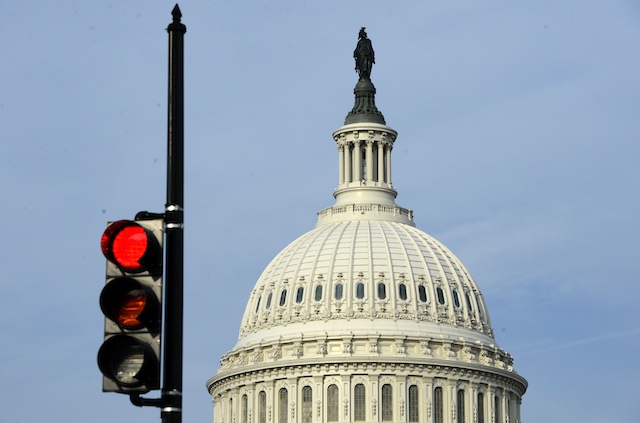SUMMARY
This is AI generated summarization, which may have errors. For context, always refer to the full article.

WASHINGTON DC, USA – With House Republicans blaming President Barack Obama for the collapse of talks on extending US borrowing authority, the Senate scrambled Saturday, October 12, to piece together a bipartisan exit strategy.
The eyes of the world are glued on Washington as politicians grapple with how to open the shuttered government and avoid a potentially calamitous failure to pay the country’s obligations for the first time in history, a scenario experts warn would send shockwaves through international markets.
With just three working days next week before the US Treasury’s October 17 deadline for raising the debt ceiling, the Senate’s Republican and Democratic leaders showed an intensifying desire to end the two-week government shutdown and ease the threat of default.
Democratic Senate Majority Leader Harry Reid, Obama’s top wingman in Congress, said he held “extremely cordial but very preliminary” talks with top Republican Senator Mitch McConnell – their first face-to-face discussion about the twin crises.
“Nothing conclusive” emerged from the talks, Reid told reporters, but he stressed that the meeting itself was a positive development given the level of acrimony on Capitol Hill.
“We’re trying to figure out a way to go forward,” he said.
Number two Senate Republican John Cornyn described the talks as “significant progress,” but it was clear that major hurdles remain.
And Reid downplayed hopes of a quick fix, as the prospects of a weekend deal appeared to slip away.
Bipartisan offer rejected
McConnell suggested a bipartisan offer spearheaded by moderate Republican Senator Susan Collins as a workable template for a possible deal, but Reid rejected it.
The measure would extend borrowing authority into 2014 and fund the government for six months, but it would also repeal a medical device tax introduced under Obama’s health care law, as an incentive to get conservatives on board.
Democratic leadership was most concerned, however, with the proposal to keep the existing automatic spending cuts, a move that would put agency spending at $70 billion below what Democrats have proposed for fiscal 2014.
“The difference between the Senate and House budget numbers… is really the single biggest sticking point,” The Washington Post quoted Senator Dick Durbin as saying.
The Senate will hold a rare Sunday session October 13, but the House of Representatives is off until Monday, October 14, when markets around the world might start seriously digesting Washington’s impasse.
In the latest warning from the finance world, top US banker Jamie Dimon of JPMorgan Chase said that “you don’t want to know” what would happen if the country is forced into default because Congress did not raise the US borrowing limit.
“It would ripple through the world economy in a way that you couldn’t possibly understand,” he said at the Institute of International Finance, a leading forum for the world’s banks.
With the House negotiations in tatters, Obama called a snap meeting at the White House with the Senate’s Democratic leadership to regroup.
Earlier this week, it was House Speaker John Boehner and his team who met with Obama and suggested a six-week extension to US borrowing authority.
Long-term deal
Despite previous comments that the White House would be open to such a plan, Obama said he wanted a long-term deal.
“It wouldn’t be wise, as some suggest, to just kick the debt ceiling can down the road for a couple of months, and flirt with a first-ever intentional default right in the middle of the holiday shopping season,” Obama said in his weekly address.
The remarks prompted frustration from House Republicans.
“They felt they were duped,” Congressman John Fleming said of the House leadership as he exited from a Republican caucus meeting.
“They were led to believe that the president did want to negotiate in good faith and now they find out that that was never in the cards.”
House Republicans have argued for any budget deal to include concessions on funding Obama’s health care reforms, while Senate Republicans are more willing to reopen government without such conditions.
Some lawmakers were adamant the House remains the linchpin for any agreement.
“At the end of the day, whatever they do (in the Senate) still has to come through here,” House Republican Tom Cole told reporters.
On Friday, October 11, the framework of a possible deal appeared to be coming together.
The government, shuttered since October 1, would be fully reopened, possibly on an interim basis.
Both sides would also commit to work toward an elusive deal to tackle the deficit, rein in spending and possibly reform social programs and some aspects of the tax code.
But, perhaps sensing that it now has the upper hand in the fight, the White House is looking for an extension of borrowing authority beyond the six-week timeframe proposed by Boehner.
Complicating any possible solution, a bill to extend the debt ceiling by 15 months with no conditions failed to advance in the Senate.
The measure would have taken the issue off the table until after the mid-term congressional elections next year, but it was unlikely to pass the Republican-led House. – Rappler.com
Add a comment
How does this make you feel?
There are no comments yet. Add your comment to start the conversation.